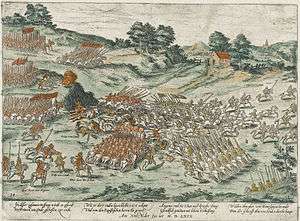Françoise d'Orléans-Longueville
| Françoise d'Orléans | |||||
|---|---|---|---|---|---|
| Princess of Condé | |||||
 Françoise d'Orléans by an unknown artist | |||||
| Born |
5 April 1549 Châteaudun, France | ||||
| Died |
11 June 1601 (aged 52) Paris, France | ||||
| Spouse | Louis, Prince of Condé | ||||
| Issue | Charles, Count of Soissons | ||||
| |||||
| Father | François d'Orléans | ||||
| Mother | Jacqueline de Rohan | ||||
| Religion | Roman Catholic (formerly Huguenot) | ||||
Françoise d'Orléans (5 April[1] 1549 – 11 June 1601) was the second wife of Louis de Bourbon, Prince of Condé, a "Prince du Sang" and leader of the Huguenots during the French Wars of Religion.
Family
Her paternal grandparents were Louis d'Orléans, Duke of Longueville, Sovereign Count of Neuchâtel, Prince of Chatel-Aillon, and Princess Johanna of Baden-Hochberg, Sovereign Countess of Neuchâtel and Margravine of Rothelin, and her maternal grandparents were Charles de Rohan, Viscount of Fronsac and Jeanne de Saint-Séverin.
Françoise had an older brother, Leonor, Duke of Longueville, Duke of Estouteville, and Prince du Sang (1540–1573), who married, in 1563, Marie d'Estouteville (1539–1601), by whom he had issue, including Henri I, himself later Duke of Longueville. Françoise's cousin, François de Longueville was the uterine half-brother of Mary, Queen of Scots. Her maternal aunt, Claude de Thoury de Rohan, was a mistress of King Francis I of France.
Infancy
Françoise was born on 5 April 1549 in Châteaudun, France. She was the only daughter of François d'Orléans, Marquis of Rothelin, Prince of Chalet-Aillon, Viscount of Melun, and Jacqueline de Rohan, herself the Marquise of Rothelin in her own right.[2] Her father had died on 25 October 1548, less than six months before her birth. From birth she was known as Mademoiselle de Longueville.
Marriage and issue
On 8 November 1565, in the Château de Vendôme, Françoise married Prince of Condé, the youngest brother of King Antoine of Navarre and a Huguenot general. This made Francoise the sister-in-law of the powerful Jeanne d'Albret, who was queen regnant of Navarre and the spiritual leader of the Huguenots. Condé's first wife, Eléanor de Roucy de Roye, had died in 1564. Together he and Françoise had three sons. Through her marriage, she ranked as a princess of the Blood.
The year before their marriage Conde's mistress, Isabelle de Limeuil, a member of Queen Mother Catherine de' Medici's notorious escadron volant ("flying squadron"), had given birth to a child which she claimed was fathered by Condé. Condé staunchly denied the accusation.[3]
Widowhood

On 13 March 1569, in the Third War of Religion, her husband was slain at the Battle of Jarnac when the Huguenot army was defeated by the Catholic forces led by Marshal Gaspard de Saulx, sieur de Tavannes, and the Duke of Anjou, who would later rule as King Henry III.[4] Queen Elizabeth I of England, herself being Protestant, promised to lend money to the Huguenot faction, however, Françoise was required to pledge her jewels as security.[4]
Françoise was left a widow shortly before her 20th birthday, and she chose not to remarry. After the night of the St. Bartholomew's Day massacre on 23 August 1572, she and her sons quickly converted to Roman Catholicism to avoid persecution and possible assassination.
Françoise died in Paris on 11 June 1601 at the age of 52, and was buried at Gaillon.
The Princes of Carignan, themselves later Kings of Italy descended from Françoise through her son Charles.[1]
Issue
- Charles, Count of Soissons (3 November 1566 – 1 November 1612) married Anne de Montafié (1577–1644) and had issue.
- Louis de Bourbon (1567–1569) died in infancy.
- Benjamin de Bourbon (1569–1573) died in infancy.
Ancestry
| Ancestors of Françoise d'Orléans-Longueville | ||||||||||||||||||||||||||||||||||||||||||||||||||||||||||||||||||||||||||||||||||||||||||||||||||||||||||||||||||||||||||||||||||||||||||||||||||||||||||||||||||||||||||||||||||||||||||||||||||||||||||||||||||||||||||||||||||||||||||||||||||||||||||||||||||||||||||||||||||||||||||||||||||||||||||||||||||||||||||||||||||||||||||||||||||||||||||||||||||||||||||||||||||||||||||||||||||||||||||||||||||||||||||||||||||||||||||||||||||||||||||||||||||||||||||||||||||||||||||||||||||||||||||||||||||||||||||||||||||
|---|---|---|---|---|---|---|---|---|---|---|---|---|---|---|---|---|---|---|---|---|---|---|---|---|---|---|---|---|---|---|---|---|---|---|---|---|---|---|---|---|---|---|---|---|---|---|---|---|---|---|---|---|---|---|---|---|---|---|---|---|---|---|---|---|---|---|---|---|---|---|---|---|---|---|---|---|---|---|---|---|---|---|---|---|---|---|---|---|---|---|---|---|---|---|---|---|---|---|---|---|---|---|---|---|---|---|---|---|---|---|---|---|---|---|---|---|---|---|---|---|---|---|---|---|---|---|---|---|---|---|---|---|---|---|---|---|---|---|---|---|---|---|---|---|---|---|---|---|---|---|---|---|---|---|---|---|---|---|---|---|---|---|---|---|---|---|---|---|---|---|---|---|---|---|---|---|---|---|---|---|---|---|---|---|---|---|---|---|---|---|---|---|---|---|---|---|---|---|---|---|---|---|---|---|---|---|---|---|---|---|---|---|---|---|---|---|---|---|---|---|---|---|---|---|---|---|---|---|---|---|---|---|---|---|---|---|---|---|---|---|---|---|---|---|---|---|---|---|---|---|---|---|---|---|---|---|---|---|---|---|---|---|---|---|---|---|---|---|---|---|---|---|---|---|---|---|---|---|---|---|---|---|---|---|---|---|---|---|---|---|---|---|---|---|---|---|---|---|---|---|---|---|---|---|---|---|---|---|---|---|---|---|---|---|---|---|---|---|---|---|---|---|---|---|---|---|---|---|---|---|---|---|---|---|---|---|---|---|---|---|---|---|---|---|---|---|---|---|---|---|---|---|---|---|---|---|---|---|---|---|---|---|---|---|---|---|---|---|---|---|---|---|---|---|---|---|---|---|---|---|---|---|---|---|---|---|---|---|---|---|---|---|---|---|---|---|---|---|---|---|---|---|---|---|---|---|---|---|---|---|---|---|---|---|---|---|---|---|---|---|---|---|---|---|---|---|---|---|---|---|---|---|---|---|---|---|---|---|---|---|---|---|---|---|---|---|---|---|---|---|---|---|---|---|---|---|---|---|---|---|---|---|---|---|---|---|---|---|---|---|---|---|---|---|---|---|---|---|---|---|---|---|---|---|---|---|---|---|---|---|---|---|---|---|---|---|---|---|---|---|---|---|---|---|---|---|---|---|---|---|---|---|---|---|
| ||||||||||||||||||||||||||||||||||||||||||||||||||||||||||||||||||||||||||||||||||||||||||||||||||||||||||||||||||||||||||||||||||||||||||||||||||||||||||||||||||||||||||||||||||||||||||||||||||||||||||||||||||||||||||||||||||||||||||||||||||||||||||||||||||||||||||||||||||||||||||||||||||||||||||||||||||||||||||||||||||||||||||||||||||||||||||||||||||||||||||||||||||||||||||||||||||||||||||||||||||||||||||||||||||||||||||||||||||||||||||||||||||||||||||||||||||||||||||||||||||||||||||||||||||||||||||||||||||
References
Sources
- Europäische Stammtafeln
- Mark Strage, Women of Power, published by Harcourt Brace Jovanovich, 1976
- Genealogy.Eu
- Père Anselme, Histoire des Rois de France